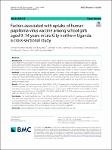Factors associated with uptake of human papilloma virus vaccine among school girls aged 9–14 years in Lira City northern Uganda: a cross-sectional study

View/
Date
2023Author
Nakayita, Renniter Mirembe
Benyumiza, Deo
Nekesa, Catherine
Misuk, Ivan
Kyeswa, Julius
Nalubuuka, Aisha
Murungi, Tom
Udho, Samson
Kumakech, Edward
Metadata
Show full item recordAbstract
Abstract
Background Cervical cancer is the most common Human Papilloma Virus (HPV)-related disease among women.
Since 2008, HPV vaccination has been routinely recommended for pre-adolescent and adolescent girls in Uganda
as the primary preventive measure for cervical cancer. However, in Uganda, most especially in Lira district, there is
limited literature on HPV vaccination uptake and associated factors among girls aged 9-14years. This study assessed
the uptake of HPV vaccine and associated factors among in-school girls aged 9–14 years in Lira City, northern Uganda.
Methods A cross-sectional study was conducted among 245 primary school girls aged 9–14 years in Lira City,
northern Uganda. Multistage sampling technique was used to sample eligible participants and data was collected
using interviewer administered questionnaire. Data was analysed using SPSS version 23.0. Descriptive statistics and
multivariate logistic regression at 95% level of significance were used to identify the level of HPV vaccine uptake and
predictors respectively.
Results HPV vaccination uptake was at 19.6% (95% CI,14.8–25.1) among the school girls aged 9–14 years in Lira City,
northern Uganda. The mean age of the girls was 12.11 (±1.651) years. Predictors that were independently associated
with HPV vaccine uptake included; recommendation from health worker [aOR 9.09, 95% CI (3.19–25.88), P≤0.001],
taught about cervical cancer at school [aOR,12.56, 95% CI (4.60–34.28), P≤0.001], and exposure to outreach clinics
[aOR, 4.41, 95% CI (1.37–14.19), P=0.013].
Conclusion The study found that one in five of the school girls in Lira City, northern Uganda. received HPV vaccine.
Girls who were taught about cervical cancer at school, exposure to outreach clinics and received health worker
recommendation had more odds of receiving HPV vaccine than their counter parts. The Ministry of Health should
strengthen school based cervical cancer education, awareness raising about HPV vaccination and health worker
recommendations to improve HPV vaccine uptake among school girls in Uganda.
Collections
- Research Articles [36]
